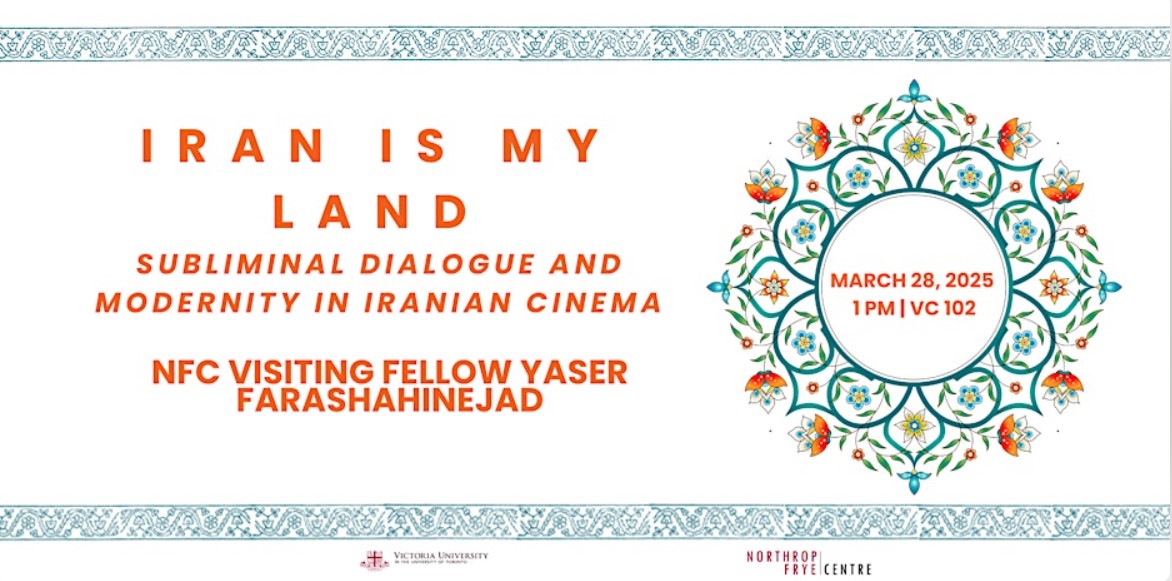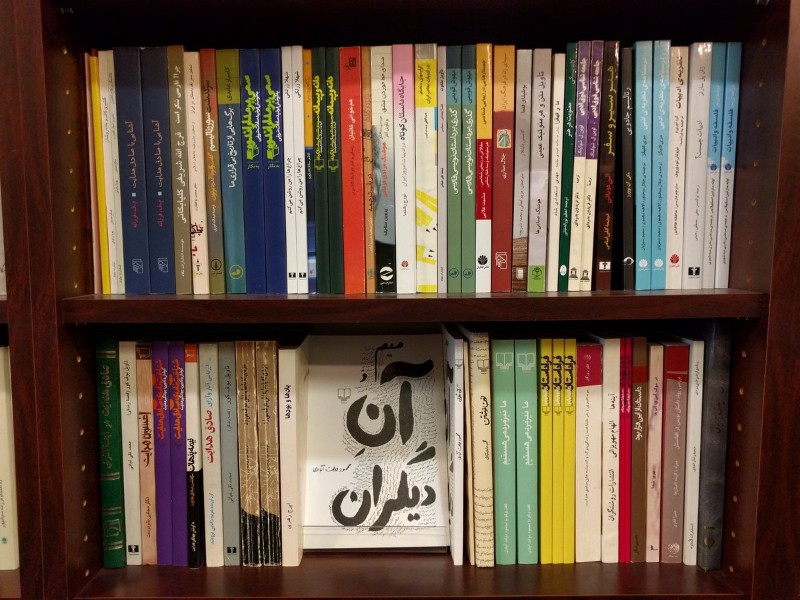Event Category: FilmsEvent Tags: #Cinema, #modernity, #nfc, and literature
- Overview
Join us for a lecture by NFC Visiting Fellow, Yaser Farashahinejad.
“Iran is my Land: Subliminal Dialogue and Modernity in Iranian Cinema”
About the talk…
The film “Iran is My Land” (1999), directed by the distinguished Iranian filmmaker Parviz Kimiavi, presents a nuanced exploration of cultural heritage and censorship through the lens of its protagonist, Sohrab—a writer and intellectual in Iran. Sohrab is driven by his aspiration to compile an anthology featuring the works of eminent Persian poets, including Rumi, Hafiz, and Firdawsī. His odyssey from southern Iran to the capital city of Tehran reflects a quest for permission from the Ministry of Censorship of the Islamic Republic, underscoring the tension between artistic expression and state control.
Upon his encounter with a censorship department employee, Sohrab confronts an ideological barrier regarding the publication of his anthology. The employee asserts that the poetry in question contains references to wine, which he deems unacceptable within Islamic cultural sensibilities. The film climaxes through a non-linear narrative structure, as Sohrab finds himself in an imaginary caravanserai. In this surreal setting, surrounded by the spectral presences of classical Persian poets, Sohrab engages in a profound discussion regarding the themes of wine and the portrayal of women in Persian poetry.
Sohrab positions his argument by contending that references to wine in poetry should be interpreted literally, while the employee counters that such references embody mystical and religious significance. This dialogue raises critical questions about the nature of interpretation and the role of cultural symbols in a contemporary Iranian context. Furthermore, Sohrab’s journey from an ancient qanat to the bustling Tehran subway serves to highlight the disconnection between the rich heritage of Persian literature and the modern urban landscape, where the names of poets are reduced to mere street names by a populace that has largely forgotten their works.
An ironic dimension of this narrative is the alignment of many Iranian intellectuals with the censorship employee’s perspective on classical Persian poetry, suggesting a broader societal ambivalence toward cultural legacy. In this lecture, I propose to analyze Kimiavi’s film through the theoretical frameworks of Marshall Berman’s “experience of modernity” and Jürgen Habermas’s concept of “communicative action.” This analysis aims to illuminate the ongoing discourse regarding the interpretation of Persian heritage in contemporary Iranian life while scrutinizing the potential for establishing equitable dialogue within a sociopolitical system predisposed to a more instrumental and system-oriented worldview. The central inquiry of this study thus pertains to whether a meaningful dialogue can be fostered in a context that challenges both artistic freedom and the legacy of Persian literature.
About the speaker…
Yaser Farashahinejad is a Northrop Frye Centre Visiting Research Fellow, Victoria College, the University of Toronto. He also served as a researcher and editor at the Elahé Omidyar Mir-Djalali Institute of Iranian Studies, University of Toronto. Yaser holds a PhD in Persian literature and language. In addition to his academic pursuits, he is also a fiction writer, poet, and translator. To date, Yaser has authored four books: Gūrʹhā-yi kāghaz̲ī (Paper Graves), published by Diyār Nāmag in 2022; Farār az furm (Escaping Form), with Tarh-e-no Publications, Tehran, in 2020; Minārahʹhā-yi vārūnah (Inverted Minarets), also published in 2020 by Tarh-e-no; and Nazarīyahʹhā-yi rumān dar Īrān (Theories of the Novel in Iran), which was brought out by Pāyā Publications in 2019. As a translator, Yaser has thus far rendered two books from English to Persian: Hamid Rezaei Yazd’s Persian Literature and Modernity (as Mudarnītah-yi guftugūʼī, published in 2021 by Tarh-e-no), and The Rumi Prescription by Melody Moezzi (also published by Tarh-e-no in 2021, under the title Darmāngarī-yi Mawlānā). He has recently finished translating Ali Mirsepassi’s Transnationalism in Iranian Philosophical Thought, the manuscript of which is currently in press. Yaser has published numerous articles both in Iran and internationally, with a particular focus on contemporary Persian literature and history. His work has appeared in various publications, including Iran Namag, where he has already published two articles. A third piece, titled “Subliminal Dialogue,” is forthcoming in the same journal. Since 2020, Yaser has also worked as an editor and book reviewer at Tarh-e-no, a highly reputable and prestigious publisher in Iran. His research interests revolve around modernity, dialogue, and the philosophy of literature.
- Photos
- How to register
On Sale 9 Feb 2025 at 9:00 PM
- Map
No Records Found
Sorry, no records were found. Please adjust your search criteria and try again.
Google Map Not Loaded
Sorry, unable to load Google Maps API.
- Reviews
- Place
- Organizer





